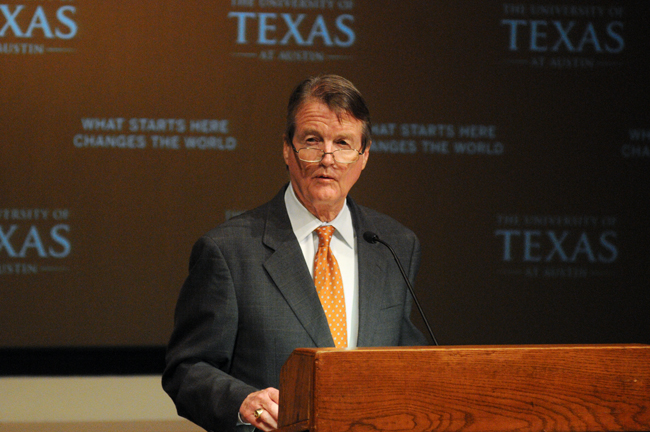In October of this year, University administrators presented a draft of a plan to implement a Shared Services model at UT.
The report, called “Smarter Systems for a Greater UT,” informed the University community about new cost reduction measures and recommendations provided by business leaders across the state. While backlash from some members of the University community has been prevalent across campus, the facts of the plan have been consistently lost in the rhetoric of the opposition, which is founded on deep-seated misunderstandings about Shared Services and the plan to optimize the performance of certain UT systems.
Accenture LLP, the firm UT has hired to help with this initiative, is in the middle of this rhetorical flurry. While Adam Tallman and Dana Cloud, the authors of a guest column in this newspaper late last week, The Texas State Employees Union (TSEU) and other detractors from the Shared Services plan would lead you to believe Accenture is working to mount a corporate takeover of the University of Texas, this view is not only ill-informed but dangerous.
In a declining economic environment with accelerating rates of attrition, keeping UT competitive for employees while affordable for students will be harder and harder — and UT administrators have a responsibility to address these challenges.
If open discussion, debate and transparency are the primary focus of the opponents of these measures, as Tallman and Cloud’s column claimed, let’s begin with facts.
Critical to understanding what the plan for the University of Texas constitutes is understanding the distinctions between words like “corporatization” and “privatization” and Shared Services — distinctions that have been blurred by the opposing side, which has vilified UT administration for its proactive cost-cutting measures during a harsh economic climate, a tuition freeze and drastic decreases in state support.
Shared Services is a tested supply-chain optimization plan which has been successfully implemented, not only by Accenture, in many other public and private institutions, including Yale, the University of Michigan and the University of North Carolina-Chapel Hill. According to Rowan Miranda, associate vice president for finance at the University of Michigan, one of the misunderstandings surrounding a shared services model is that it’s a simple, across-the-board solution that ignores the needs of individual departments.
“It’s a model that recognizes differences among the customers and tries to develop processes that are responsive to them,”
Miranda said.
Equating a shared services plan with outsourcing, as the opposition has consistently done in recent weeks, is simply not in line with the facts of these business models. UT stands in stark contrast to universities who have opted for actual privatization, like Texas A&M, whose consolidation plan included cutting 1,600 food service, maintenance, custodial and landscaping jobs and employing outside companies.
“I do think we have a certain responsibility to our employees. [That is] part of our DNA that’s different,” Kevin Hegarty, chief financial officer for UT, told the Texan. “I can say this having done 25 years in corporate, is that we actually do care about people.”
Of course, transparency should be a top concern for the members of the UT community. We have a responsibility to make sure the UT administration is making decisions that are best for students, faculty and staff. The administration understands this – that’s why they aren’t haphazardly accepting recommendations and are consulting with focus groups composed of faculty and students.
“I want to see the detail, I want to see what backs it up,” Hegarty said in response to the recommendations. “So does President Powers… [That’s why he said,] ‘Hegarty, organize groups, and let’s study… let’s adapt them to our campus, our situation and have the committees come back to me with recommendations as to what they think we ought to do.’”
Ultimately, there are some services public institutions cannot provide for themselves and seeking advice from a private company is warranted. The “Smarter Systems for a Greater UT” plan is about supporting UT’s mission to be one of the premier research institutions in the country — a lofty goal which cannot come without sacrifice. In discussing “Smarter Systems for a Greater UT,” it’s time to move past rhetoric and learn the facts.
Jordan is an English and finance junior from Missouri City.





















